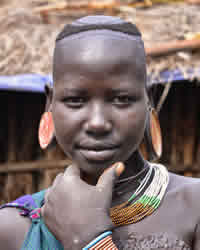Suri in Ethiopia

Photo Source:
Rod Waddington - Wikimedia
Creative Commons
|
Send Joshua Project a map of this people group.
|
| People Name: | Suri |
| Country: | Ethiopia |
| 10/40 Window: | Yes |
| Population: | 4,000 |
| World Population: | 8,600 |
| Primary Language: | Suri, Kacipo-Bale |
| Primary Religion: | Ethnic Religions |
| Christian Adherents: | 4.47 % |
| Evangelicals: | 3.47 % |
| Scripture: | Translation Started |
| Ministry Resources: | No |
| Jesus Film: | No |
| Audio Recordings: | Yes |
| People Cluster: | Nilotic |
| Affinity Bloc: | Sub-Saharan Peoples |
| Progress Level: |
|
Introduction / History
The Suri people are not the kind of people that get the attention of anthropologists. They are small in number, but not dying out as a people. They do not live a lifestyle that stands out in this part of the world. Fortunately, there is some missionary work among this animistic people.
The Suri people live the regions where South Sudan and Ethiopia come together.
What Are Their Lives Like?
The Suri people live in a land that is hilly, so there are challenges for raising crops. Some of their land is forested.
What Are Their Beliefs?
The primary religion practiced by the Suri people is animism, a religious worldview that natural physical entities including animals, plants and even inanimate objects possess a powerful spiritual essence. There is a small Christian minority among them, but the only Christian materials in their language are some gospel recordings.
What Are Their Needs?
This people group has believers reaching out to them, but they need the JESUS Film and other resources to understand the gospel. As of 2011, there has been a book about their grammar, which can open the door for translating these materials.
Prayer Points
Pray for a spiritual revival among Suri elders, leading to family-based fellowships.
Pray that they will be willing to understand that the God of the Bible has all power, and all worship is due to him alone.
There are few Christian materials for this people group. Pray for the JESUS Film to become easily available in their language.
Pray for a Disciple Making Movement to flourish among this people group, both in South Sudan and in Ethiopia.